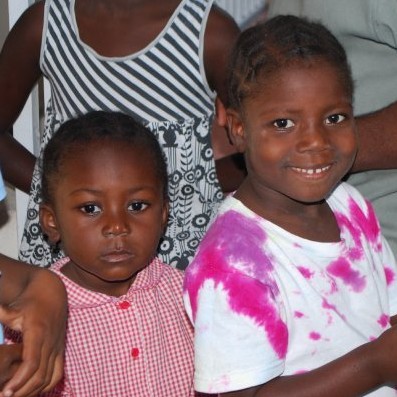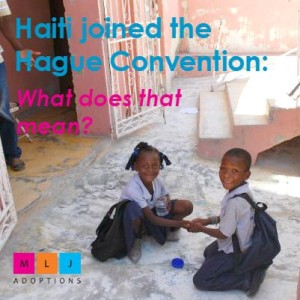 In April 2014, Haiti became the latest country to join the Hague Convention on the Protection of Children and Co-operation in Respect of Inter-Country Adoption (the Hague Convention). Eighty-eight countries are members of the Hague Convention, which “is an international agreement to establish safeguards to ensure that intercountry adoptions take place in the best interest of the child.” MLJ Adoptions has previously shared about the benefits of adopting from a Hague Convention country, and there are many benefits, but how each country chooses to implement requirements varies from country to country. As Haiti continues to operate under the Hague Convention, the international adoption community learns more about how they have applied the requirements to their country’s adoption process.
In April 2014, Haiti became the latest country to join the Hague Convention on the Protection of Children and Co-operation in Respect of Inter-Country Adoption (the Hague Convention). Eighty-eight countries are members of the Hague Convention, which “is an international agreement to establish safeguards to ensure that intercountry adoptions take place in the best interest of the child.” MLJ Adoptions has previously shared about the benefits of adopting from a Hague Convention country, and there are many benefits, but how each country chooses to implement requirements varies from country to country. As Haiti continues to operate under the Hague Convention, the international adoption community learns more about how they have applied the requirements to their country’s adoption process.
- IBESR Matches Children With Families: In every Hague Convention country, a Central Authority must be designated to determine the requirements for adoptive parents, documents included in the dossier, and the procedure by which children in need are matched with prospective adoptive families. In Haiti, Institut du Bien Etre Social et de Recherches (IBESR) serves as the Central Authority. IBESR reviews the dossier of the prospective adoptive family and the child’s dossier to make a match in the best interest of a child. With a Central Authority matching children with families, there is a greater level of oversight in the referral process.
- Crèches Are Licensed: In order to be matched with a family, children must be living at licensed crèches, or orphanages. In addition to being responsible for issuing referrals, IBESR is also responsible for overseeing the crèches. With IBESR playing such an integral role in international adoption from Haiti, it introduces a level of accountability and transparency that was previously missing prior to Haiti joining the Hague Convention. While increased oversight can mean longer wait times, it also allows adoptive parents to have greater confidence that their child is being cared for well prior to and during the adoption process.
- Medical and Social Information: When adoptive parents receive a referral from a Hague Convention country, the referral documents must include medical and social information for the referred child. MLJ Adoptions recommends that families take this information to an International Adoption Clinic. Consulting with a doctor specializing in international adoption can help prepare adoptive families for what the adoptive child may require once he is placed in their home. In the event that the international adoption doctor asks for additional information on the child, MLJ Adoptions can always ask, and provide the information, if it is available.
- Birth Parent Education: International adoption is permanent, and it is important that all parties involved understand its permanency. IBESR has developed a birth parent education program designed to help birth parents understand the permanency of international adoption, and also to share other options that may be available to them. In order for a child to be legally free for international adoption, and able to be referred to a family, a child’s birth parents must have completed the education, which takes about three months.
Implementing Hague Convention requirements and procedures has been a lengthy process in Haiti, but it has introduced greater oversight and increased safeguards into the international adoption process. The oversight and safeguards help to ensure that the adoption is completed in the best interest of the child; for families who are interested in adopting from Haiti, ethical practices and a stable adoption process is of the upmost importance.
MLJ Adoptions currently has a limited number of spots available in our Haiti Program. If you’re interested in learning more, please contact us.

